Background of the study
Theoretical Importance
The theoretical significance of the study can be proven by the fact that it allows for defining the links between the entrepreneurial marketing and the sustainability of SMEs. The problem has not yet been researched fully, though some attempts have been undertaken (Morrish, 2011).
- Sustainability Theory in business is a set of principles, following which, a leader of an entrepreneurship may achieve social and environmental sustainability (Mort, Weerawardena & Liesch, 2012).
- Entrepreneurial Marketing is a concept involving the strategies required for promoting the services of an enterprise to the target audience (Sole, 2013).
- Since entrepreneurial marketing demands that an organization should satisfy the needs of all stakeholders, a company must develop an efficient sustainability strategy to reduce the possible negative effect on the environment and, therefore, on the customers and partners (Sarma, Septiani, Ratna & Siregar, 2013).
Theoretical Importance
The theoretical significance of the study can be proven by the fact that it allows for defining the links between the entrepreneurial marketing and the sustainability of SMEs. The problem has not yet been researched fully, though some attempts have been undertaken (Morrish, 2011).
- Sustainability Theory in business is a set of principles, following which, a leader of an entrepreneurship may achieve social and environmental sustainability (Mort, Weerawardena & Liesch, 2012).
- Entrepreneurial Marketing is a concept involving the strategies required for promoting the services of an enterprise to the target audience (Sole, 2013).
- Since entrepreneurial marketing demands that an organization should satisfy the needs of all stakeholders, a company must develop an efficient sustainability strategy to reduce the possible negative effect on the environment and, therefore, on the customers and partners (Sarma, Septiani, Ratna & Siregar, 2013).
SMEs in Saudi Arabia
- Saudi Arabia is one of the fastest developing economies in the Middle East. It is regarded as one of the biggest economies in the Gulf Cooperation Council (GCC) (Royal Embassy of Saudi Arabia Information Office 2013).
- About 93 percent of all registered business units in Saudi Arabia are SMEs, 80 percent of the country’s workforce are from SMEs (Ahmad 2012; Bakar, A. R. A., & Hashim, F. 2012).
- SMEs contribute to 33 percent to Saudi Arabia GDP (Al-Dabbagh 2013).
- The average life span of Saudi Arabia SMEs is 7 years only (Ahmad 2012; Hertorg 2010).
General SMEs Challenges
- The majority of SMEs tend be unsuccessful due to their shortage of future planning, absence of managerial skills, marketing knowledge and competencies or capabilities (Dyer and Ross 2008).
- Several challenges that faces SMEs such as lack of awareness, limited access to information and technology, lack of skills and qualified personnel, and limited access to finance (OECD 2010).
- SMEs face some limitations such as having few major customers, limited resource in business and marketing; the influence of the entrepreneur, the lack of formal organizational structures or formal systems of communication (Jones and Rowley, 2011; Kolabi et al., 2011).
SMEs Sustainability
- SMEs play a pivotal role in ensuring that the economy is sustainable (McDaniel 2002).
- There is evidence that few small businesses introduce formal practices to manage their sustainability impacts. A major reason for such a predominantly reactive approach to sustainability challenges is a lack of human and financial resources that can be dedicated to environmental or other sustainability issues (Merritt, J. Q. 1998; Petts, J., Herd, A., Gerrard, S., & Horne, C. 1999).
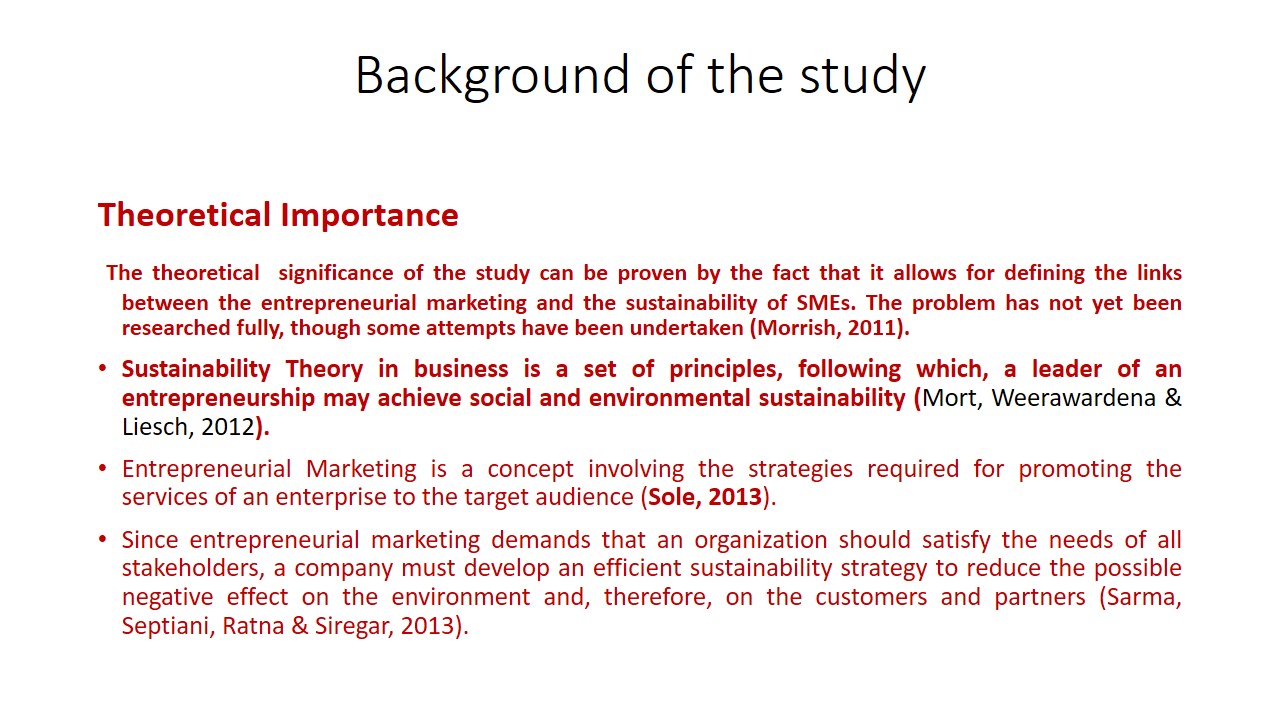
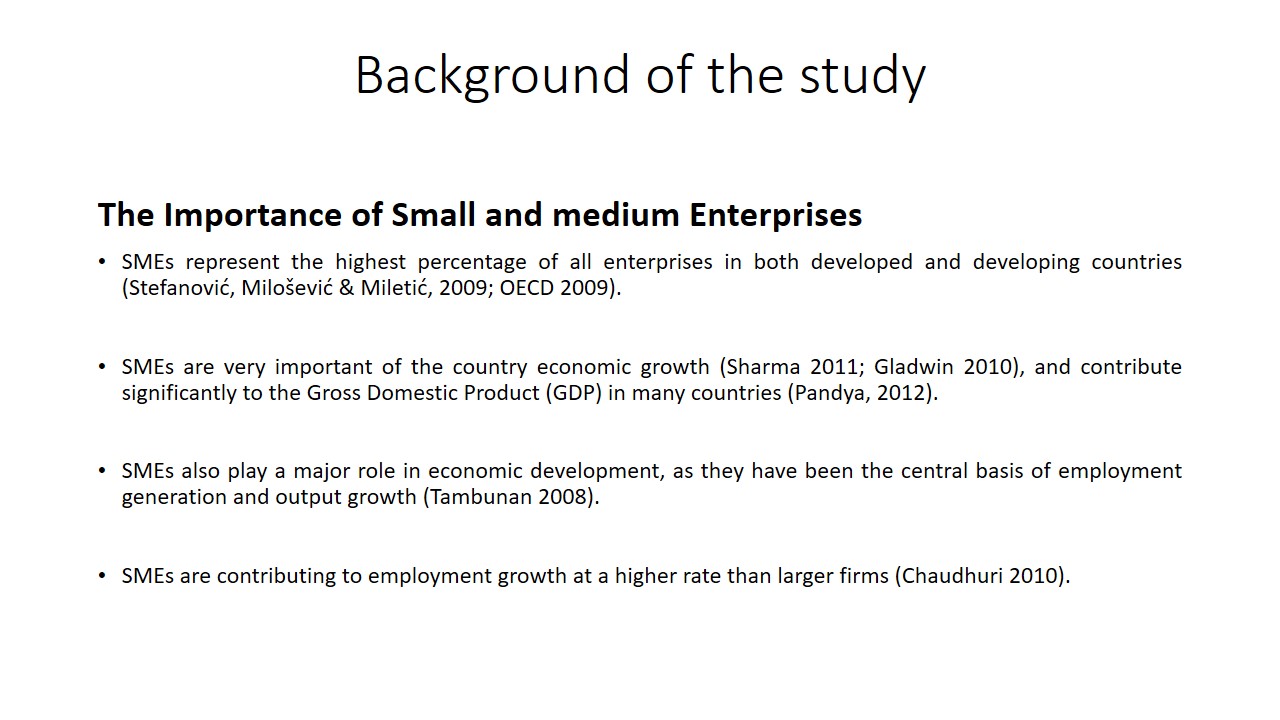
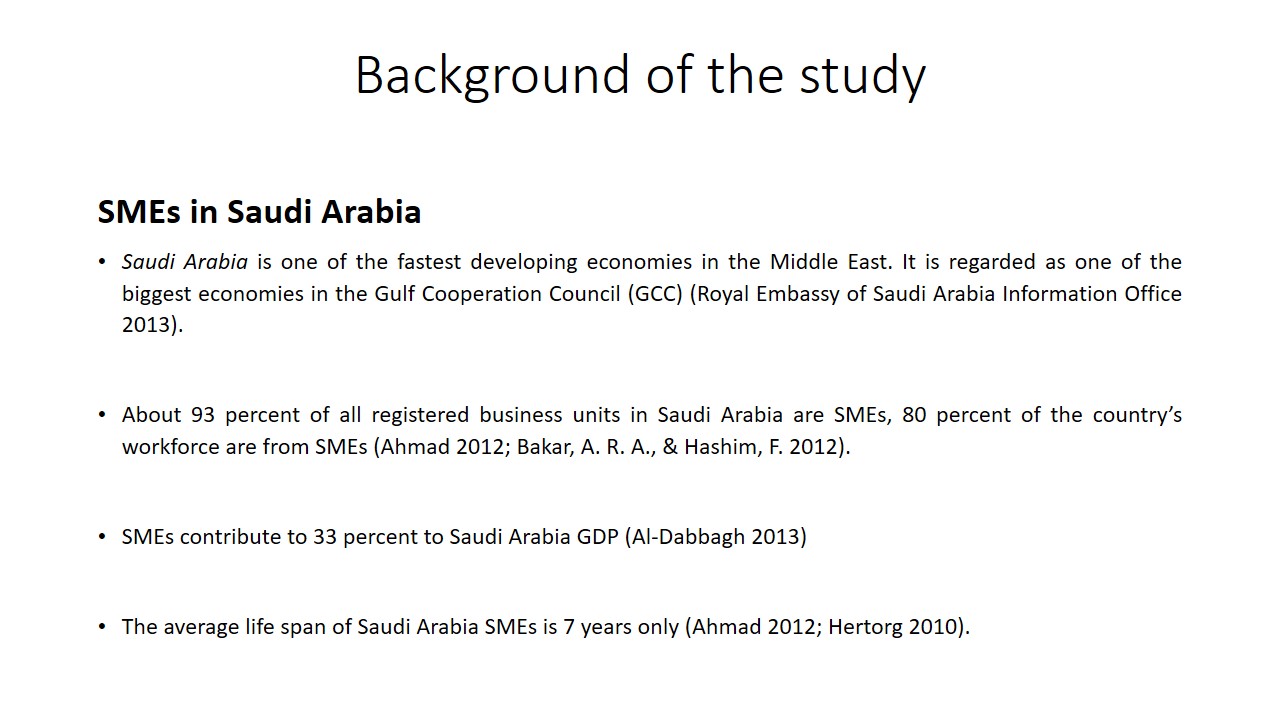
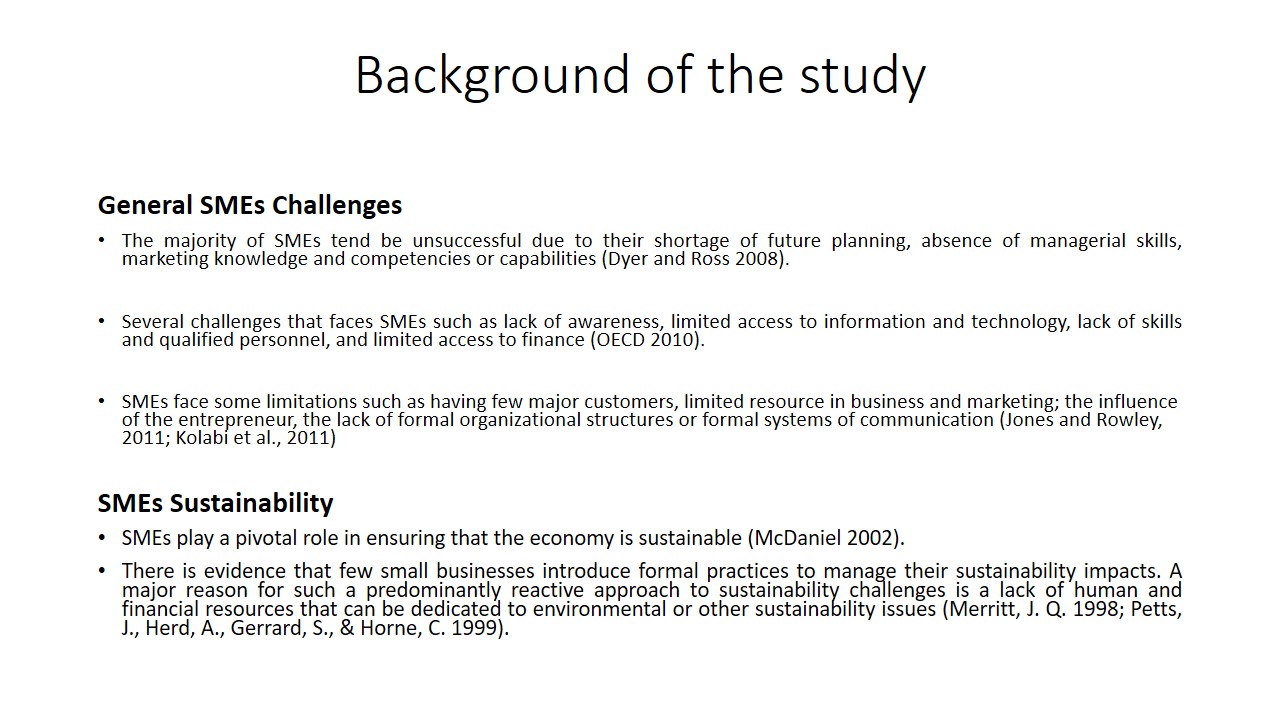
Problem Statements
Because of the seeming lack of links between sustainability principles and the success of entrepreneurial marketing, the emphasis is rarely put on the former. As a result, economy, environment and the stakeholders are threatened (Lafuente, Lafuente, Guzman-Parra & Lafuente, 2013).
Since most Saudi entrepreneurs prefer not to invest into their staff’s professional development, the sustainability of the Saudi business is threatened greatly (Alsamari, 2013).
By disregarding such a crucial part of entrepreneurial evolution as creativeness, most Saudi SME leaders face a rapid and drastic demise of their companies. (Otsuki, 2002)
The lack of emphasis on innovativeness and resource leveraging caused by the necessity to focus on financial issues leads to failure of a range of the Saudi SMEs (Shalaby, 2004).
General SMEs Sustainability Problems:
- The Saudi SMEs facing main problems such as lack of fund, insufficient talented human resources, marketing and managerial problems that limit their survivability period up to 7 years only (Hertorg, 2010).
- Lack of managerial and marketing skills (Ahmad, 2012; Shalaby, 2004; Otsuki, M. 2002).
- Lack of modern technology, Know-how, innovation and bureaucracy (Ahmad, 2012; Hertorag, 2010).
- Limited funding and government support (Alsamari, 2013; Ahmad, 2012; Looney, 2004; Standerd Chartered Bank, 2009; Otsuki, M. 2002).
- Human resources challenges such as limited access to qualified and talented manpower (Hertorg, 2010; Otsuki, 2002).
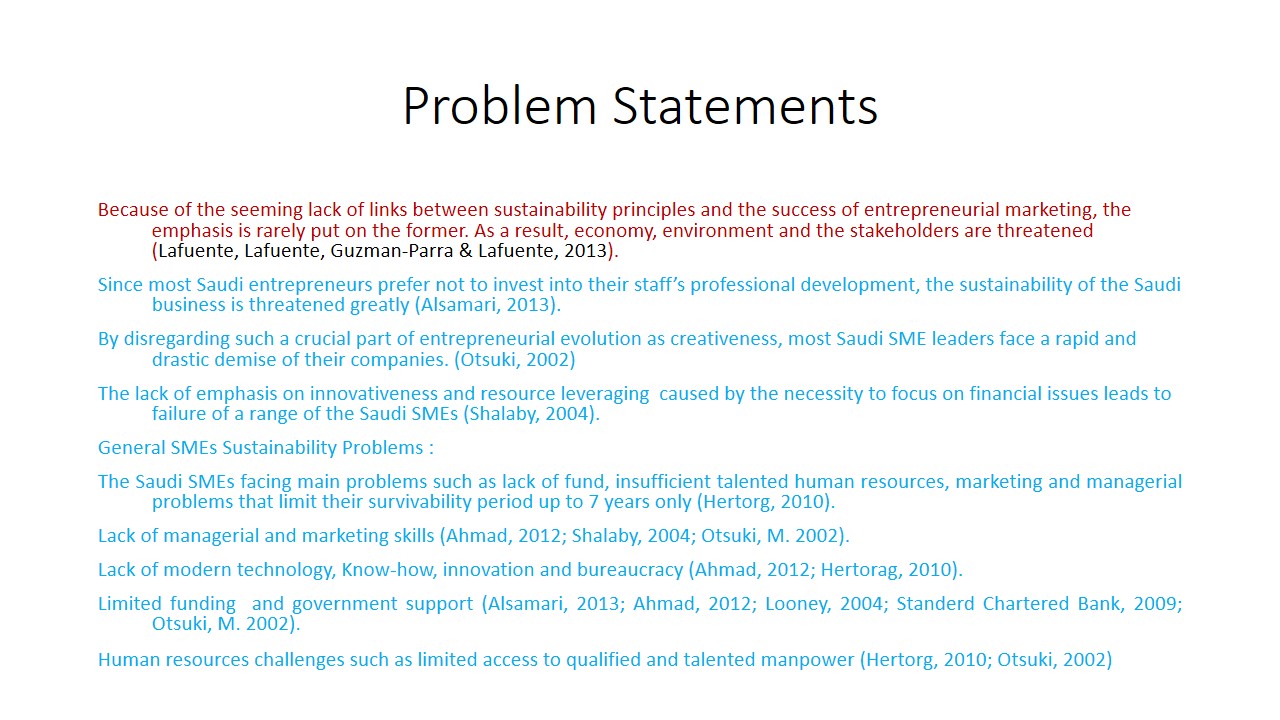
Research Questions
The general research question of this research is would entrepreneurial marketing dimensions have significant effect on SMEs Business Sustainability?
The specific research questions are:
- To what extend proactiveness, innovativeness and resource leveraging as dimensions of entrepreneurial marketing effect on SMEs business sustainability?
- To what extend value creation and customer intensity effect on SMEs proactiveness?
- To what extend value creation and customer intensity effect on SMEs innovativeness?
- To what extend value creation and customer intensity effect on SMEs resource leveraging?
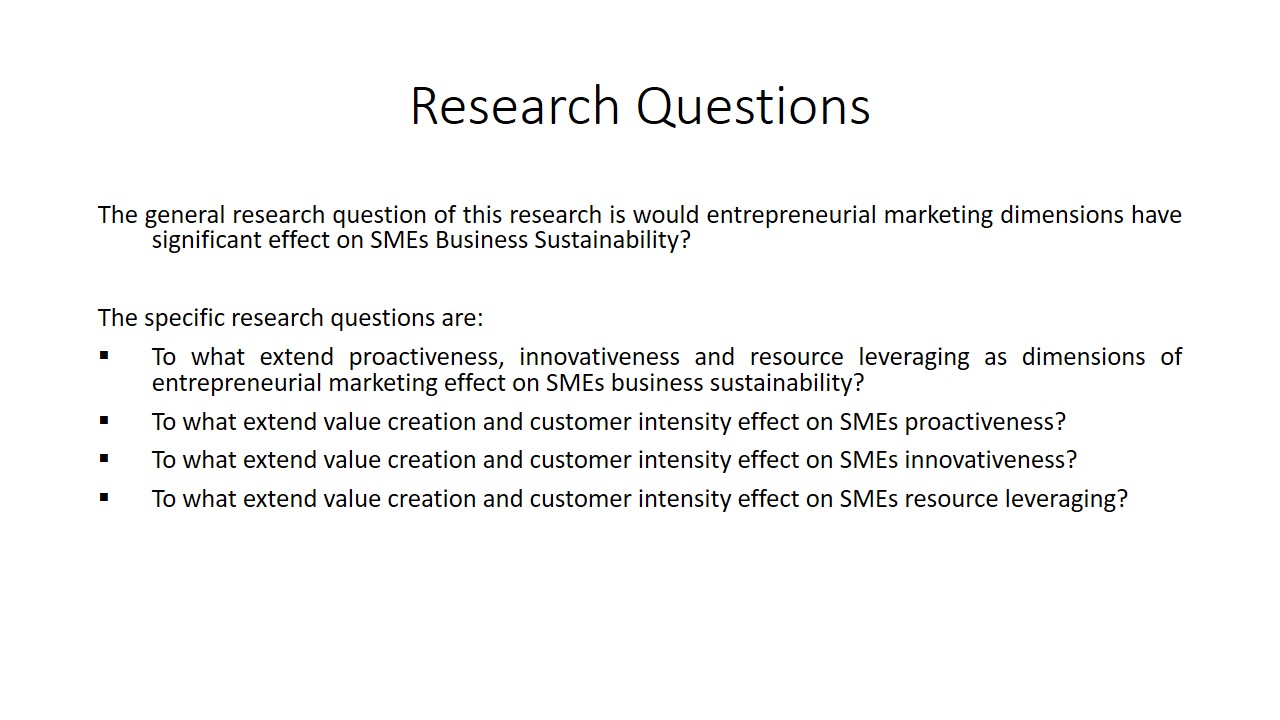
Research Objectives
The general goal of this research is to examine the effect of entrepreneurial marketing on SMEs Business Sustainability
In addition, the research aims at exploring the avenues for improving the current situation concerning the Saudi entrepreneurship.
Moreover, defining the strategies, which will help enhance value creation in the Saudi SMEs, will be outlined.
Specifically, this research aimed at achieving following objectives:
- To examine to the predictive effect of proactiveness, innovativeness and resource leveraging on SMEs business sustainability.
- To examine the predictive effect of value creation and customer intensity on SMEs proactiveness.
- To examine the predictive effect of value creation and customer intensity on SMEs innovativeness.
- To examine the predictive effect of value creation and customer intensity on SMEs resource leveraging.
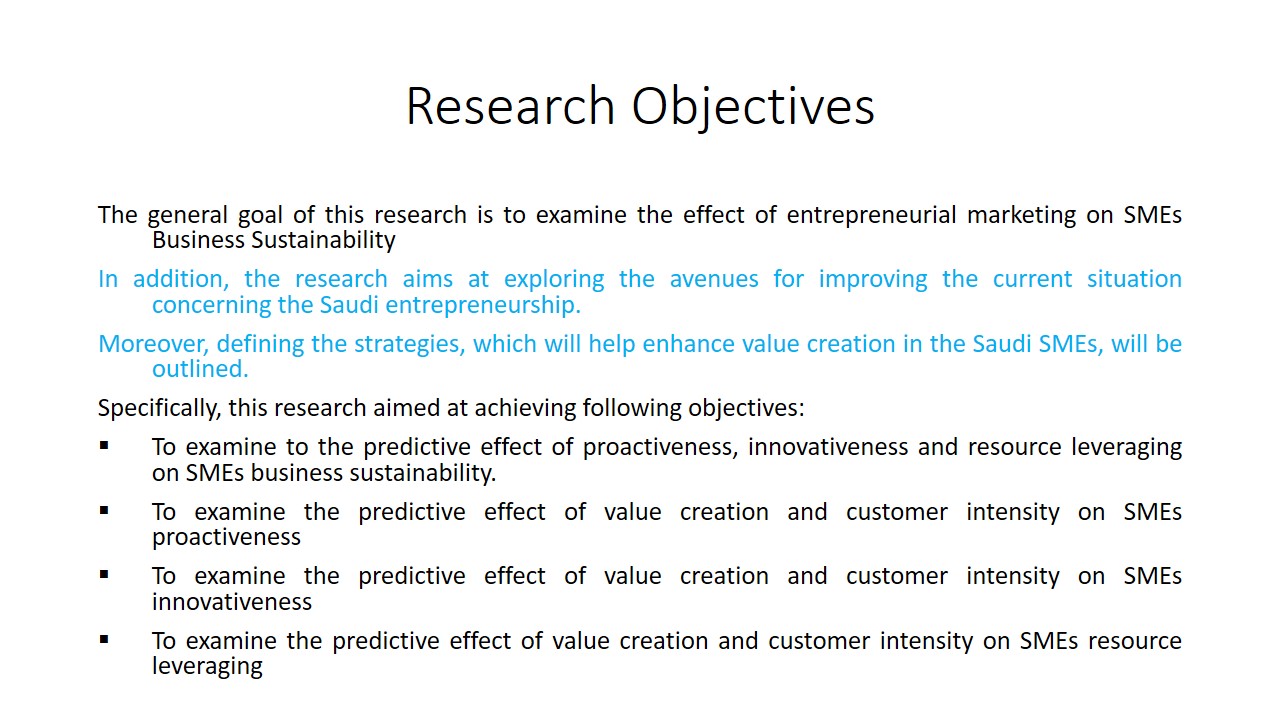
Contribution of the Study
Theoretical Contribution
- This study will add to the existing knowledge of entrepreneurial marketing and sustainability studies by examining the relationship between entrepreneurial marketing dimensions and sustainability.
- Particularly examining the specific key dimensions that affect sustainability in Saudi Arabia SMEs.
- Providing empirical evidence on the entrepreneurial marketing by validating a model of sustainability in SMEs.
- Introducing a strong link between the entrepreneurial marketing strategies and the sustainability principles, thus, tying together the economic an the environmental issues.
Managerial Contribution
- Providing a detailed understanding of sustainability and what it means to small and medium sized entrepreneurs in Saudi Arabia, and other countries having a similar socio-economic and political structure as Saudi Arabia.
- Providing knowledge to the entrepreneurs and other business executives managing SMEs on how entrepreneurial marketing can help them achieve sustainable advantage in their operations.
- Giving expert advice to business executives of SMEs on the importance of hiring skilled employees who understand marketing dynamics and able to define the best ways of achieving sustainability.
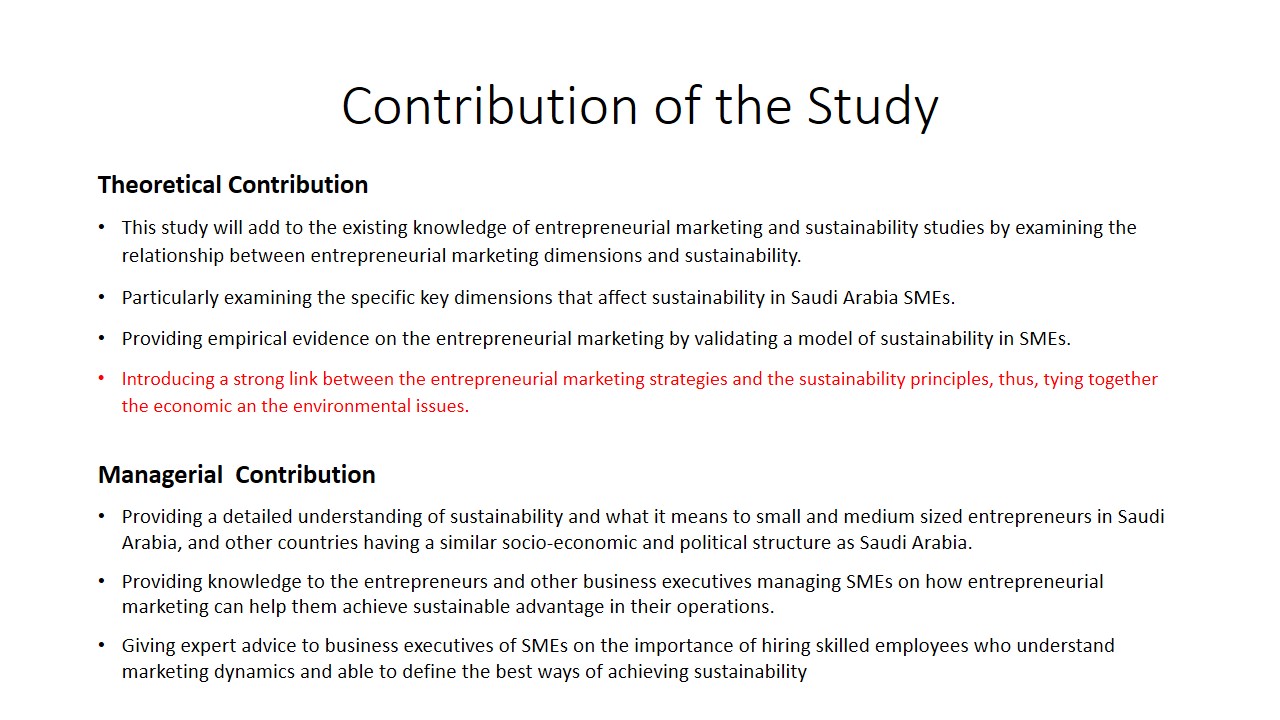
Literature Review
Theoretical Framework
Sustainability Theory
The sustainability theory presupposes that all elements of an entrepreneurship must exist in harmony and be coordinated carefully.
Conceptualization of Entrepreneurial Marketing (CEM)
Presupposing that an entrepreneurial value is created based on the principles of customer satisfaction and meeting the expectations of the TA.
Entrepreneurial Marketing Effect on Business Sustainability can be explained by:
- Effectuation Logic: the sustainability of an enterprise often depends on the analysis of a specific marketing situation rather than on the standard set of tools; (Sarasvathy, 2001);
- Resource-based Theory: investing into human resources is one of the most reasonable steps to make in order to maintain sustainability, especially when considdering appeal to the TA the key to success (Morris, Kuratko, Allen, Ireland & Schindehutte, 2010);
- Transaction Cost Theory: the idea of creating an enterprise on one’s own terms may create the premises for greater risk; therefore, coordinating the production process through market exchange ensures sustainability (Johnsen, 2009);
- Resource Advantage Theory: with a unique marketing based principle to arrange the work of an enterprise with, it is imperative to make as efficient use of the existing resources as possible (Hunt, 2012).
Sustainability
Global sustainability has been defined as the ability to “meet the needs of the present without compromising the ability of future generations to meet their needs.” United Nations – WCED 1987.
SMEs Sustainability
Sustainable corporation is one that creates profit for its shareholders while protecting the environment and improving the lives of those with whom it interacts” (Savitz & Weber 2006).
A sustainable enterprise is one that contributes to sustainable development by delivering simultaneously economic, social, and environmental benefits—the so-called triple bottom line (Elkington, 1994).
Entrepreneurial Marketing
“Proactive identification and exploitation of opportunities for acquiring and retaining profitable customers through innovative approaches to risk management, resource leveraging and value creation.” (Morris et al., 2002).
It is widely accepted that Entrepreneurial marketing is particularly appropriate to the small business context (Jones and Rowley 2011; Gilmore and Carson 1991). Entrepreneurial marketing is the marketing of small firms growing through entrepreneurship (Bjerke and Hultman 2002).
Entrepreneurial Marketing Dimensions
Proactiveness: Involves the attitude and capabilities that allow implementation and control of the new products, service, or processes ahead of the competitors in the market (Liu et al., 2002:370).
Innovativeness: Innovativeness is referred to search for creative, novel, or unusual solutions to problems and needs, i.e., development of new products, services, and/or processes (Morris, Sexton 1996, Morris et al. 2002, O’Dwyer, Gilmore et al. 2009).
Value Creation: Involves discovering untapped sources of customer value and to create unique combination of resources to produces value. (Morris et al., 2002).
Resource Leveraging: The ability to recognize a resource not being used optimally, see how the resource could be used in a non-conventional way, and convince those that control the resource to let the marketer use it involves insight, experience, and skill (Morris et al., 2002).
Customer Intensity: It incorporates the need for creative approaches to customer acquisition, retention, and development. Moving estimates of value and customer equity guide decisions regarding customer investment and customization levels (Morris et al., 2002).
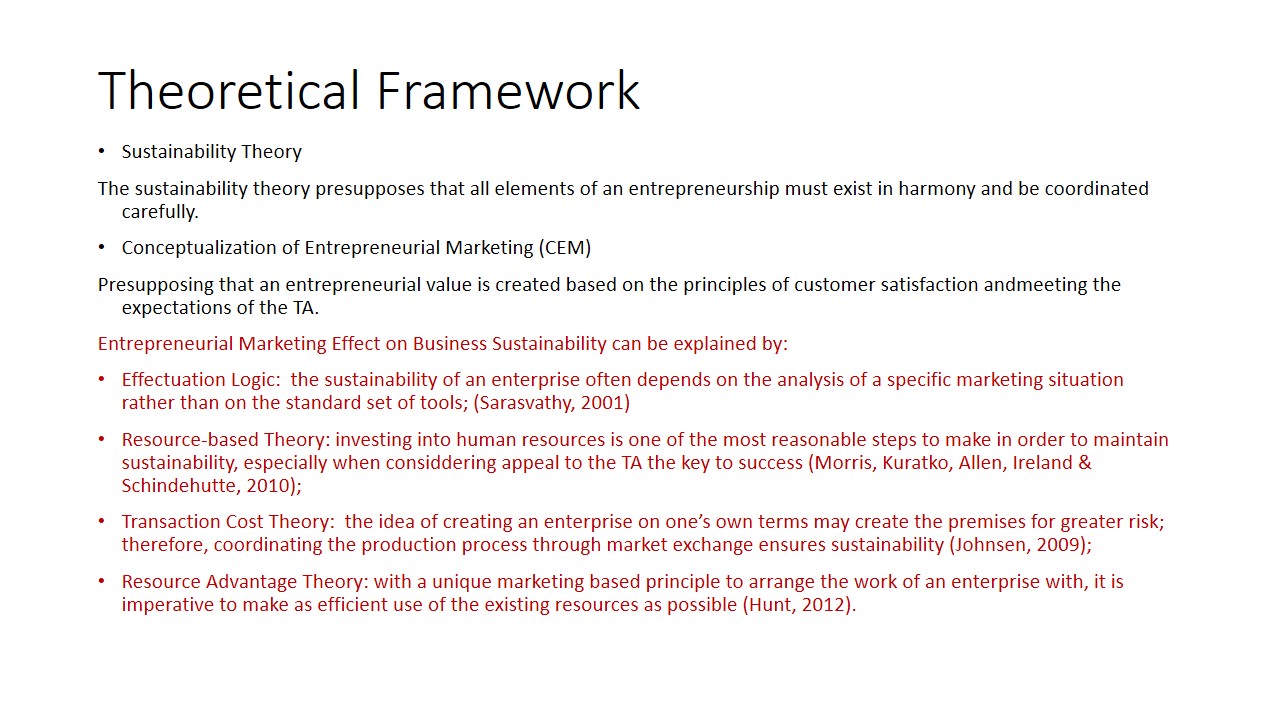
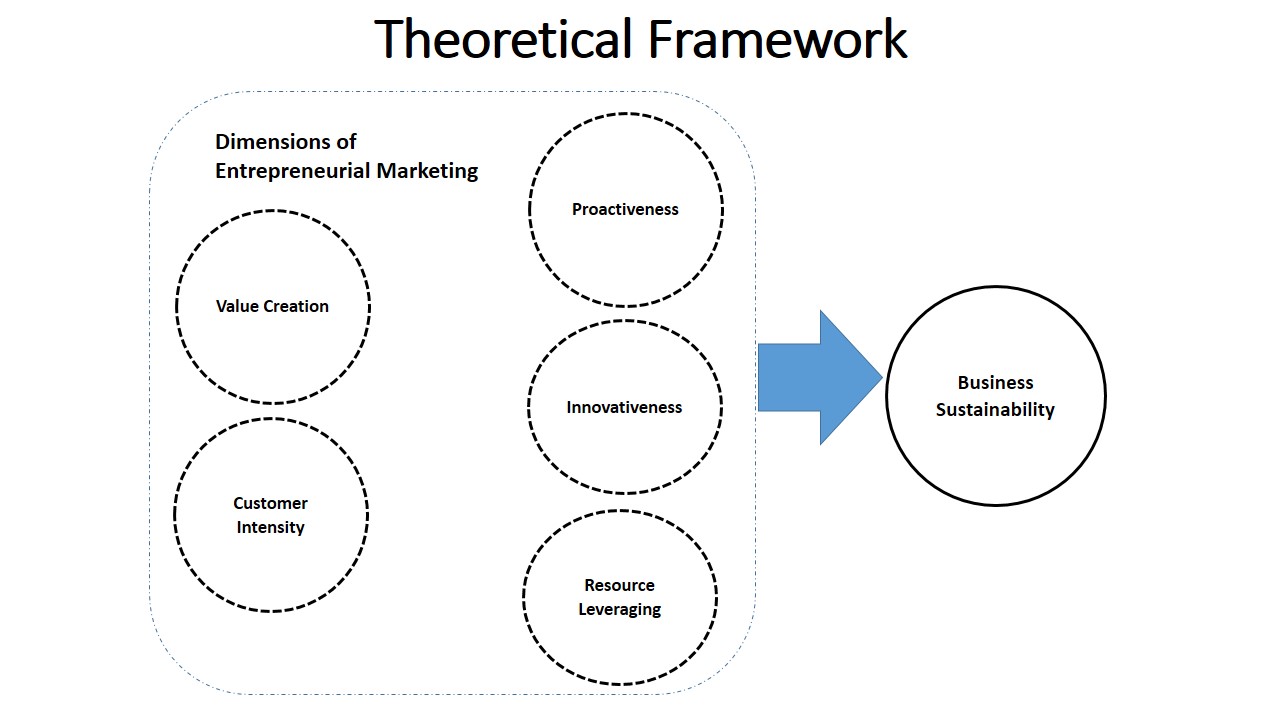
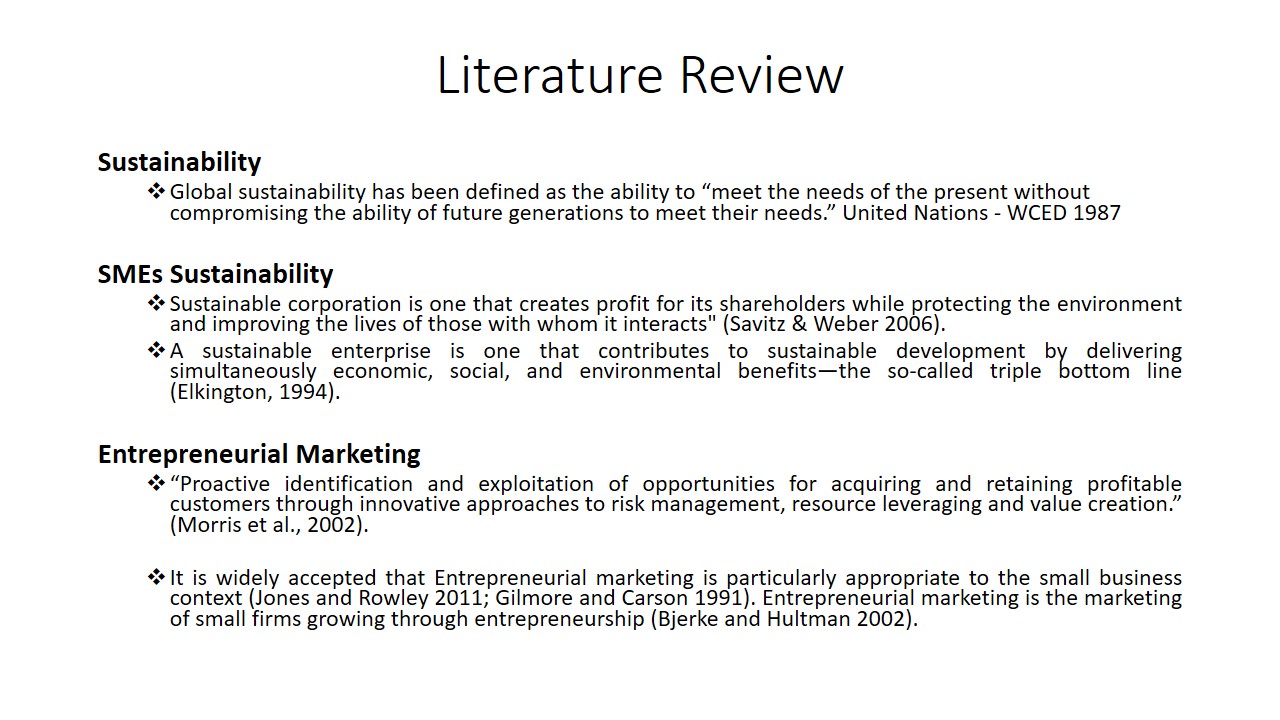
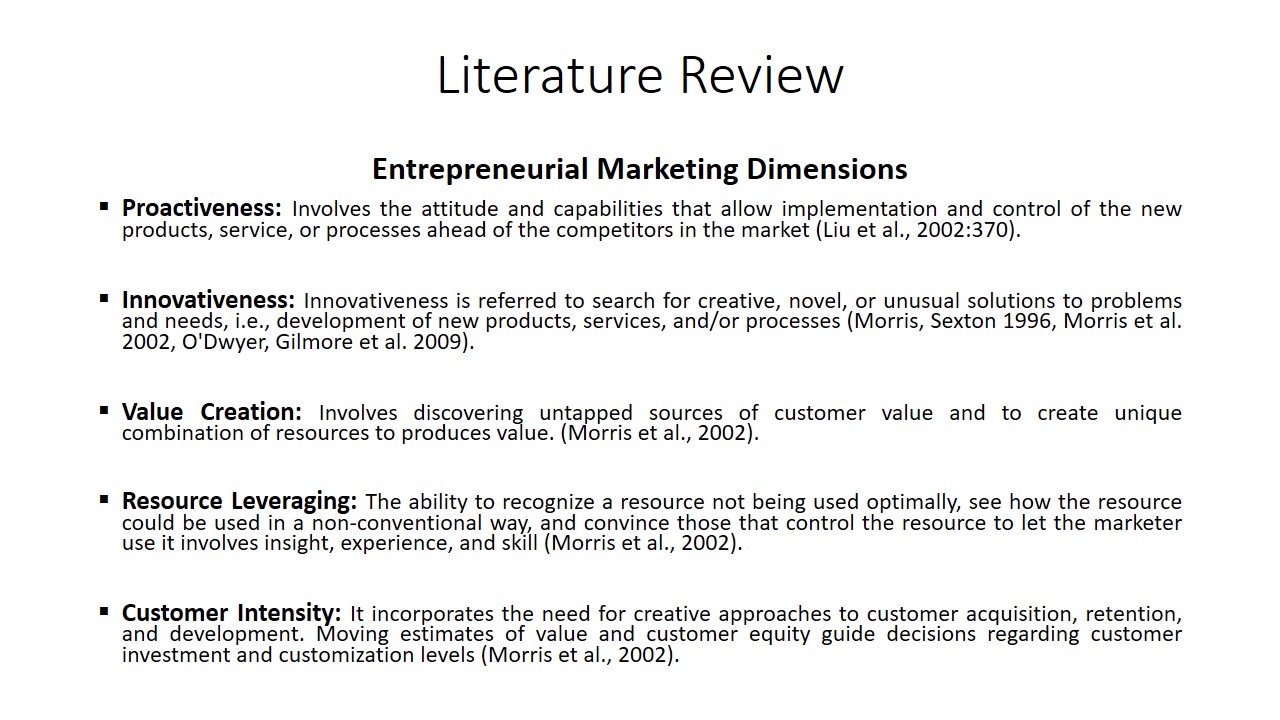
Research Gaps
Sustainability theory has been advocated, however, there is limited empirical research to examine business sustainability or sustainability as a whole (social, economic, environment) (Parrish, 2010).
Empirical work on predictive factors of SME business sustainability is also limited (Do, Mazzarol, Volery & Reboud, 2014; ).
In literature, it was highlighted that SMEs need to be a proactive, innovative and leveraging resource; the extended questions would be are these factors have positive effect on sustainability? (Ravazzani & Mazzei, 2012; Gilmore & O’Dwyer, 2009).
There were fragmented studies indicating that entrepreneurial marketing might solve SME issues, researchers suggest future empirical research on this potential relationship (Gilmore, 2011; Harrigan, Ramsey & Ibbotson, 2012).
It was also unconfirmed how the dimensions of entrepreneurial marketing relate to each others and relate to business sustainability (Becherer, Helms & McDonald, 2012; Bettiol, Di Maria & Finotto, 2012).
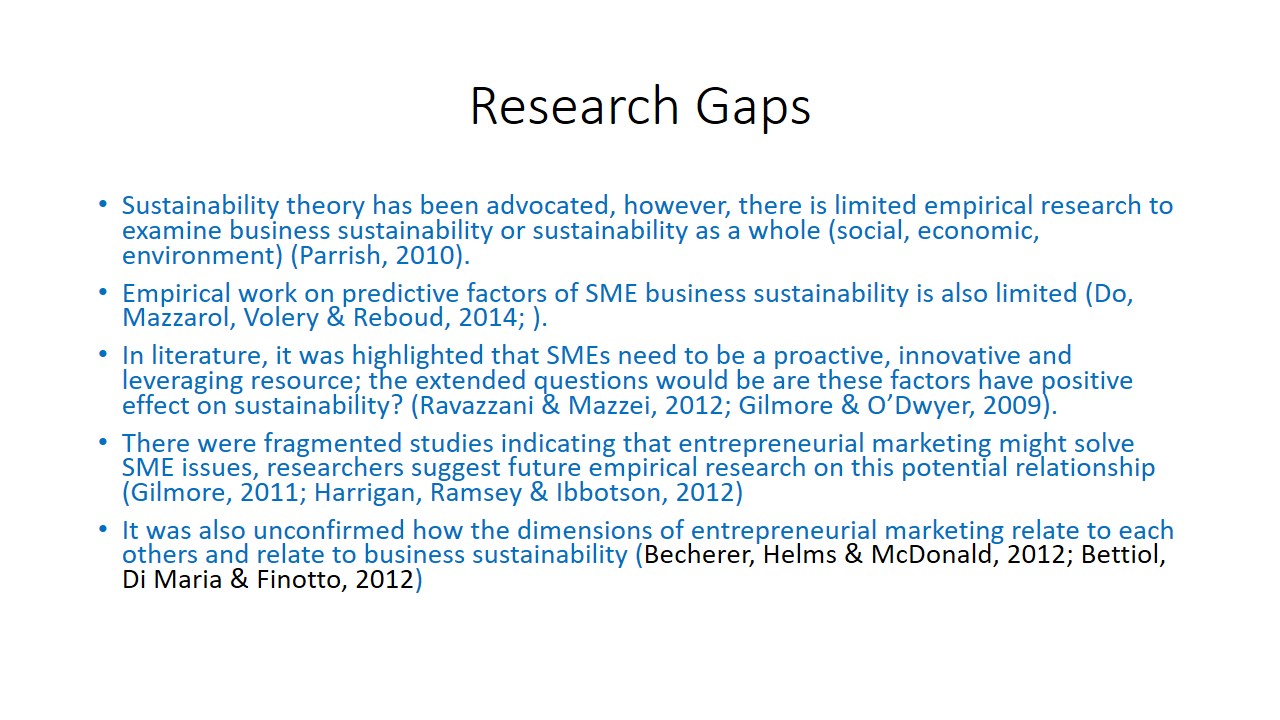
What is new in this study?
- The study is going to establish a link between entrepreneurial marketing and the sustainability theory;
- A strategy that will allow for taking the interests of all stakeholders will be developed;
- An approach that will include the key postulates of sustainability theory and the steps to successful marketing will be developed;
- The concepts of customer intensity and value creation, which are traditionally considered separately, will be incorporated to produce a perfect sustainability model.
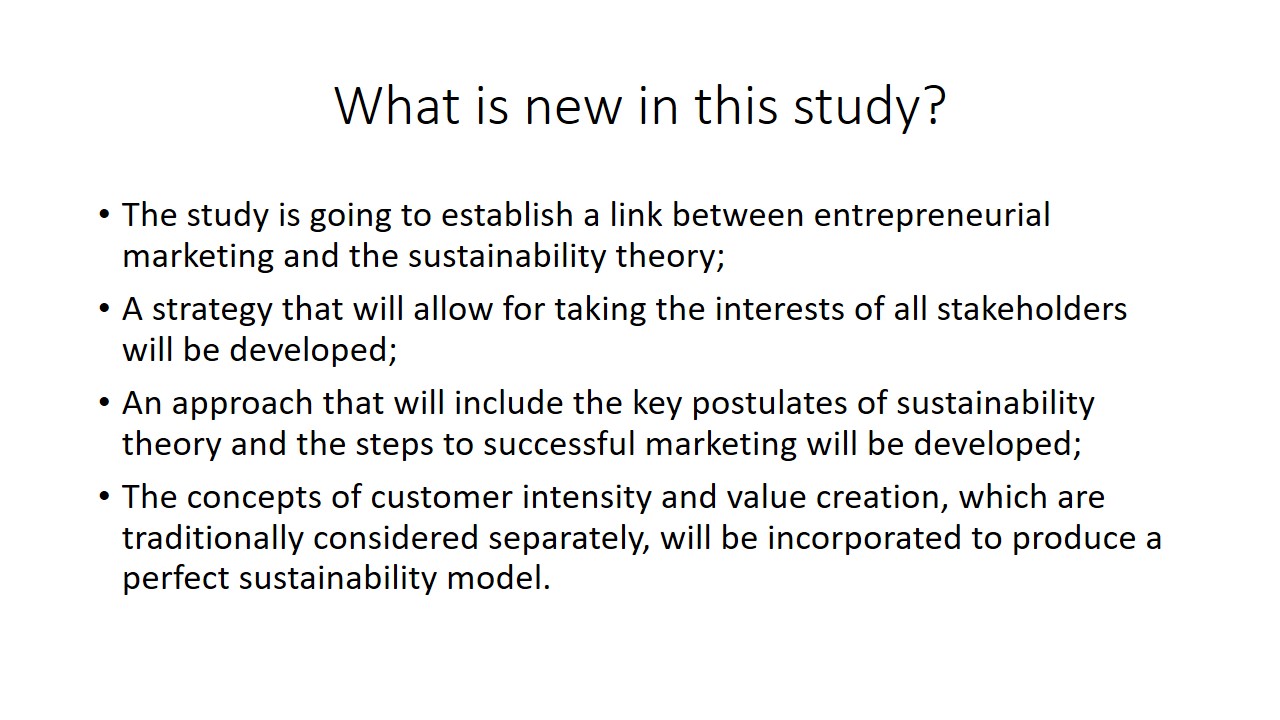
Research Model and Hypotheses
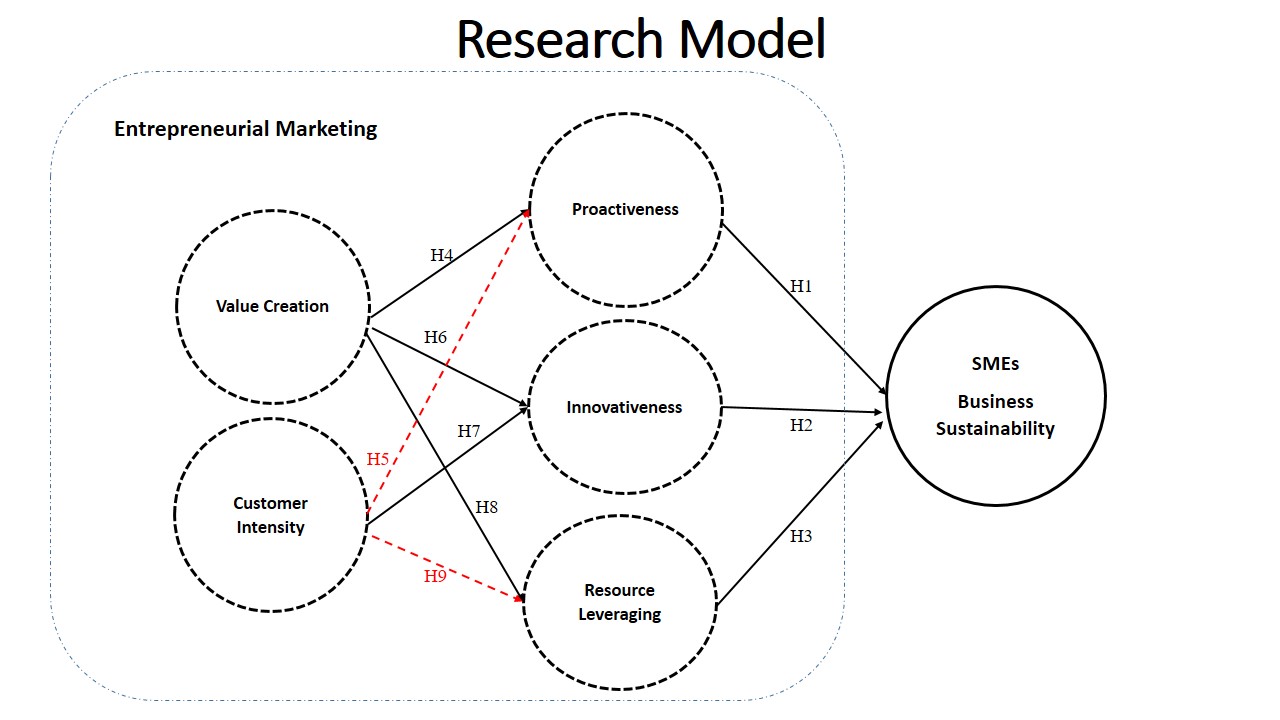
Hypotheses & Supportive Literature
H1: Proactivenesswill have positive effect on business sustainability of small and medium enterprises.
Proactiveness associated with entrepreneurial orientation is suggested to have a positive influence on business sustainable development based on either the demand or supply sides of the market. Through the maxim of looking into the future and taking advantage of market opportunities can promote sustainable development. At the same time proactive companies, i.e. those which are best at identifying and exploiting market opportunities, can in their operational framework strive to exploit the market opportunities created by sustainable development (Gaweł, A. 2012; Mitra, et al.2008 ).
H2: Innovativeness will have positive effect on business sustainability of small and medium enterprises.
Innovation and entrepreneurial conduct are processes that are holistic, vibrant and complementary fundamental to an organization’s sustainability and success. In the setting of internationalization and fast change in technology, the significance of innovation has basically changed so that entrepreneurial SMEs have the image of driving innovation. Many of the new processes and innovations undertaken may be essential to the future growth and sustainability of the small firm (Ling et al. 2008; Currie et al. 2008; Kickul, J. & Gundry L. 2002).
H3: Resource Leveraging will have positive effect on business sustainability of small and medium enterprises.
To be included, refer to Resource-based theory.
H4: Value Creation will have a positive effect on Proactiveness practices of small and medium enterprises.
to be included, the value creation effort —-contribute towards proactiveness.
H5: Customer Intensity will have positive effect on Proactiveness practices of small and medium enterprises.
To be included customer acquisition, retention, and development closely related to proactiveness.
H6: Value Creation will have positive effect on innovativeness practices of small and medium enterprises.
The value co-creation paradigm represents a specific market-driven approach to the adoption of an open innovation business philosophy. It provides a dynamic understanding of firms’ innovation boundaries which opens the possibility for a better competitive positioning through a better articulation of their innovativeness. Existing literature clearly emphasizes that customer participation in value co-creation activities should impact their innovation outcomes, such as innovation cost, time-to-market, new product/service quality and development capacity (Kristensson et al., 2008; Prahalad et al., 2008; Nambisan, 2009; Midgley, 2009; Romero et al., 2009; Bowonder et al., 2010; Ramaswamy et al., 2010).
H7: Customer Intensity will have positive effect on innovativeness practices of small and medium enterprises.
The study of Hacioglu, Eren, Eren, and Celikkan (2012) revealed that customer intensity has significant positive relationship with innovative performance. It can be thus argued that small and medium sized firms do attach a great importance to consumers to reach higher innovative performance.
While firms have always sought to hear the “voice of the customer,” customers have traditionally tended to play a passive role as recipients of the firm’s innovation activities. Firms seek to improve fit between their offerings and customer needs by surveying customers and importing knowledge from leading-edge customers into the firm (Sawhney, M. Verona, G. & Prandelli, E. 2005; Von Hippel 1988).
H8: Value Creation will have positive effect on resource leveraging practices of small and medium enterprises.
The theory of RBV suggests that possessing valuable and rare resources provides the basis for value creation (Barney 1991). According to this prospective, firms can succeed to the extent they develop and own resources that help them to create value (Autumn 2004). It is also confirmed that to realize value creation, firms must accumulate, combine, and exploit resources (Grant 1991; Sirmon & Hitt 2003; Sirmon 2007).
H9: Customer Intensity will have positive effect on Resource Leveraging practices of small and medium enterprises (Mooij, Keen & Orihara, 2013; Wang & Feng, 2012).
To be included…customer acquisition, retention, and development closely related to resource leveraging.
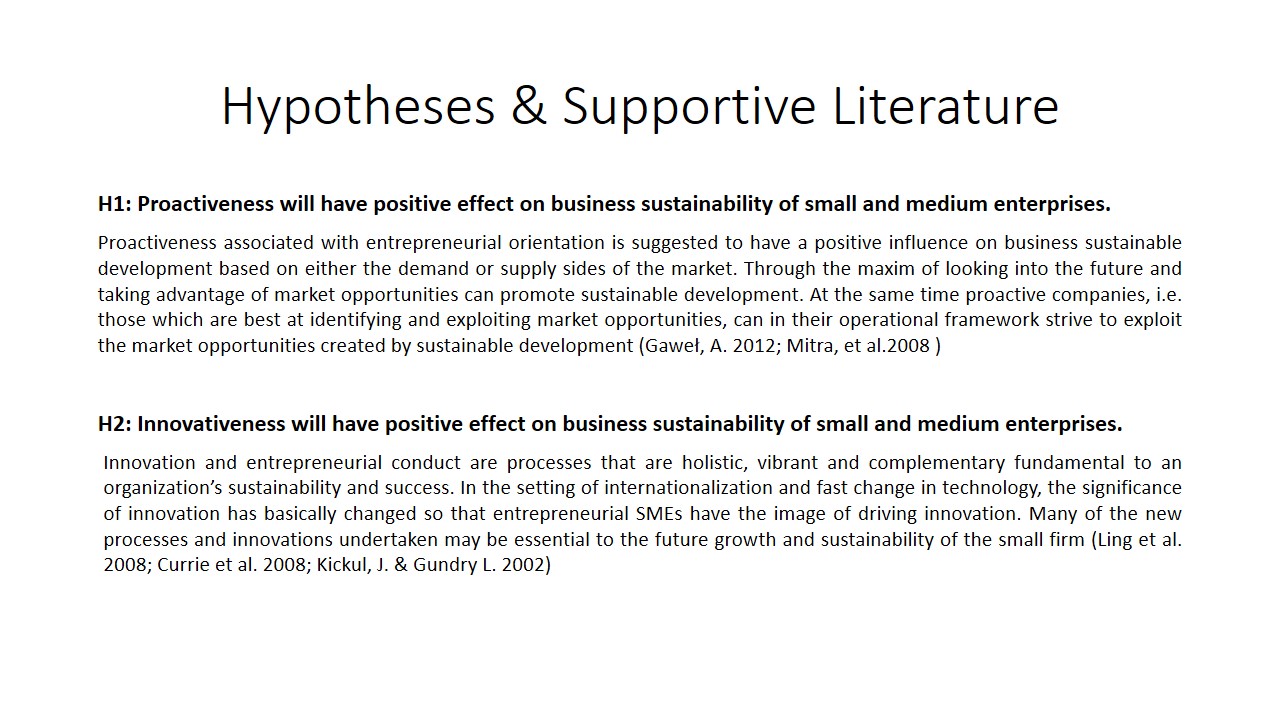
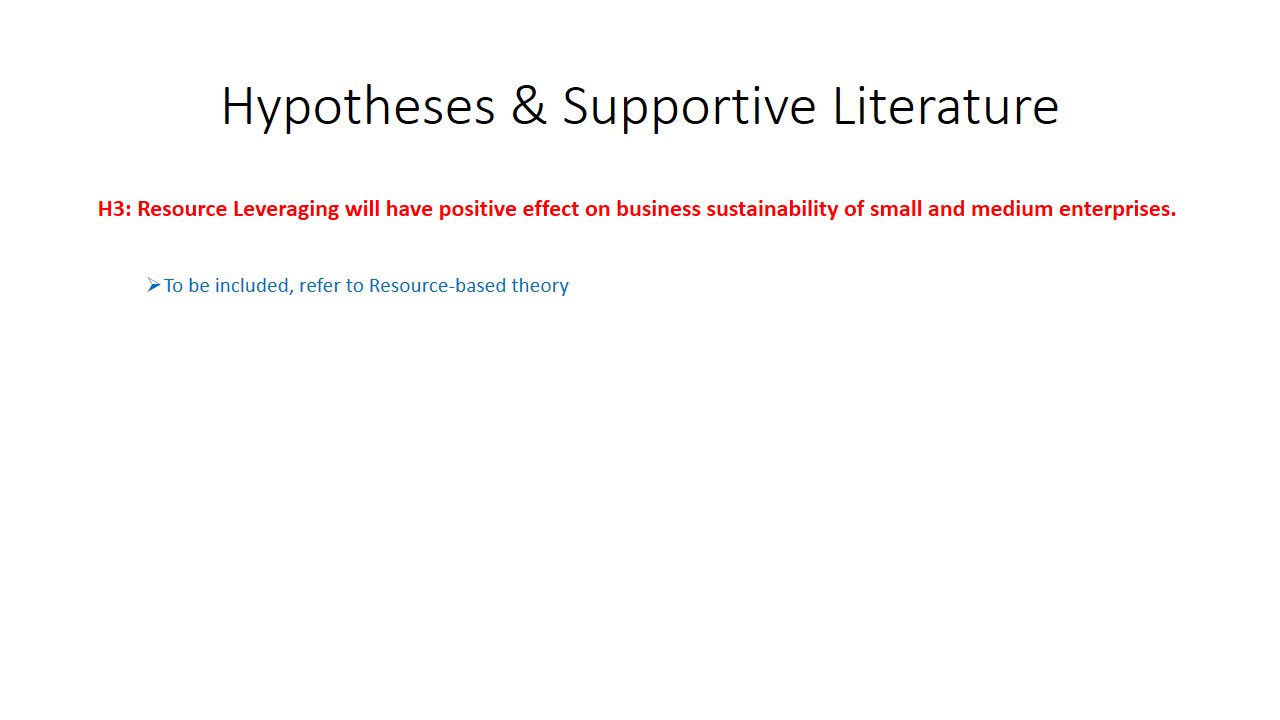
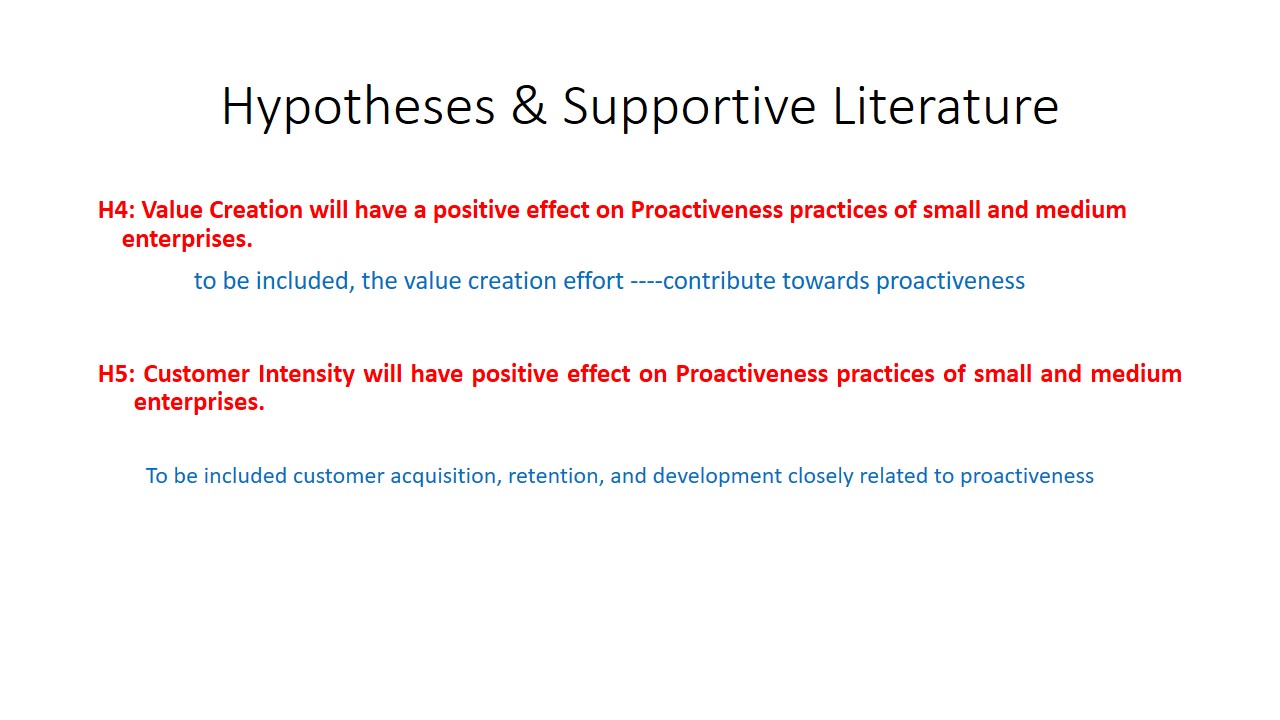
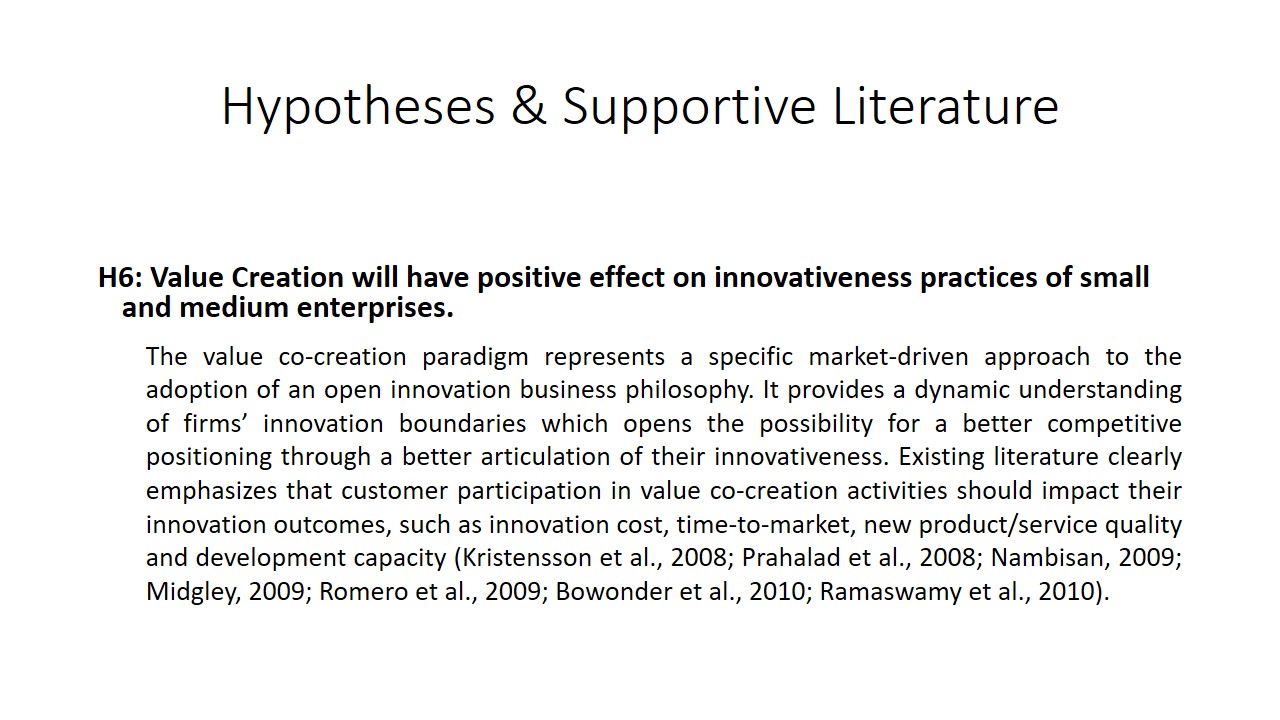
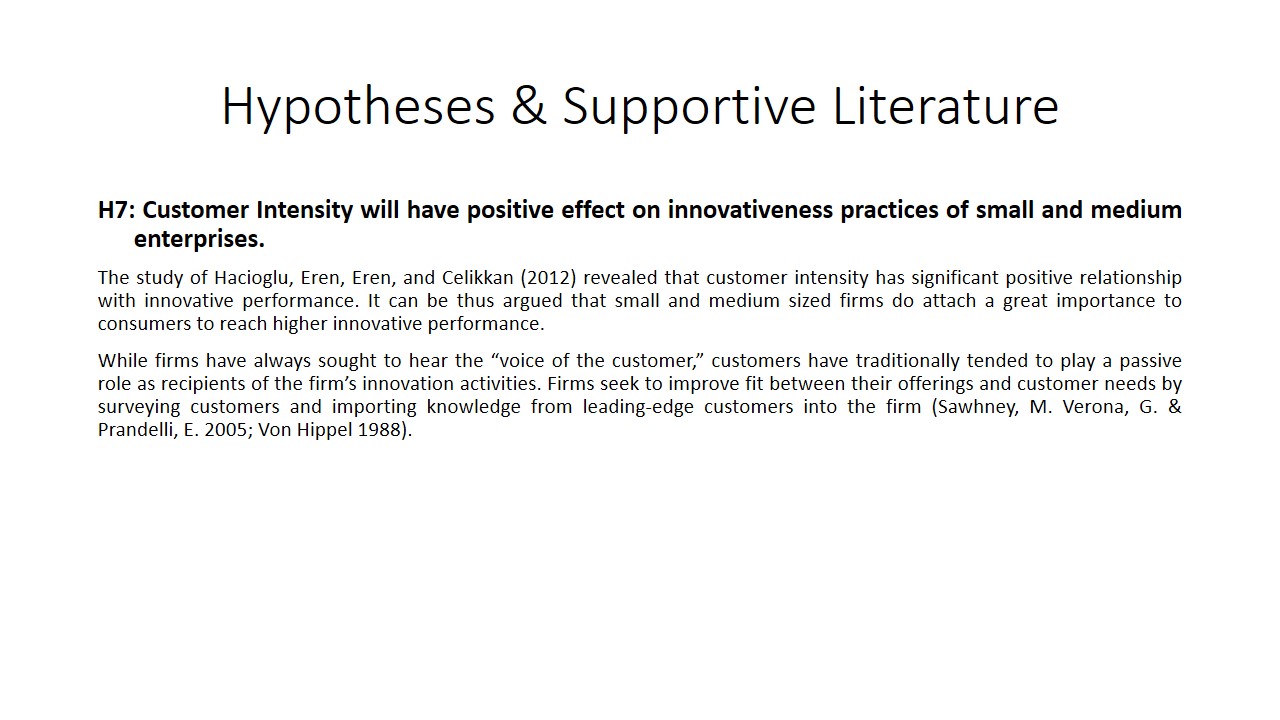
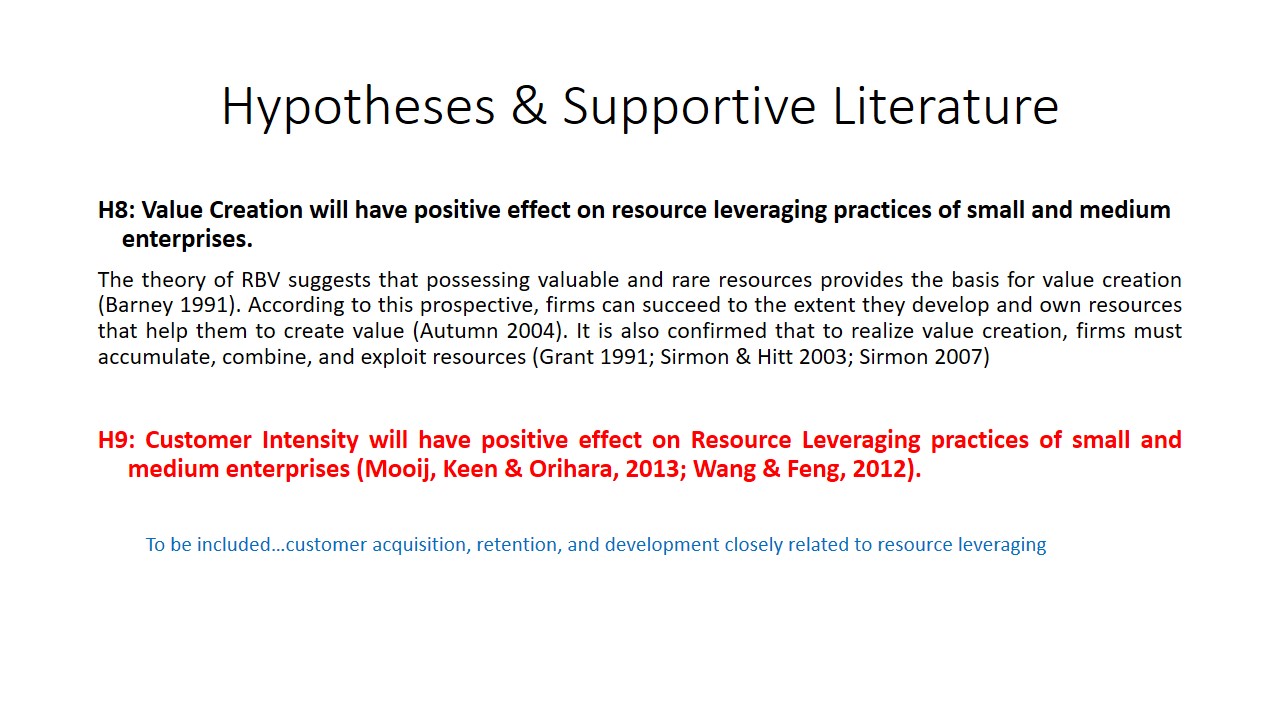
Research Methodology
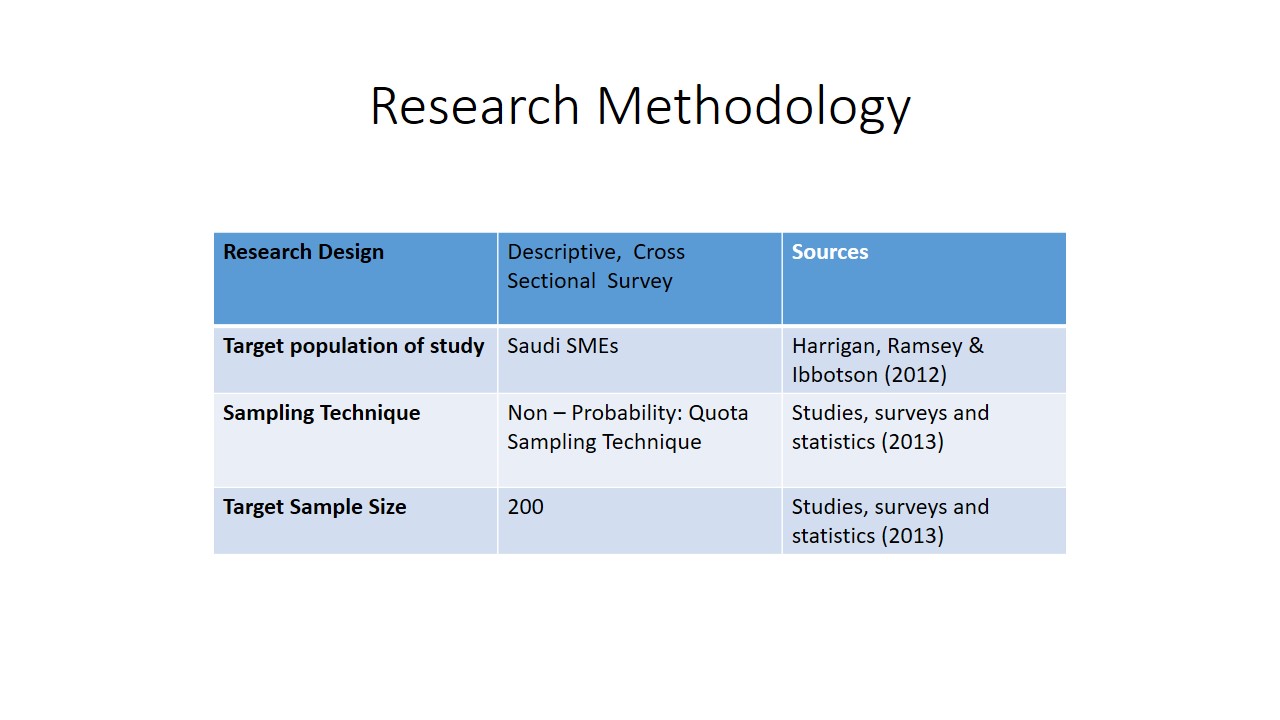
Measurement Scale
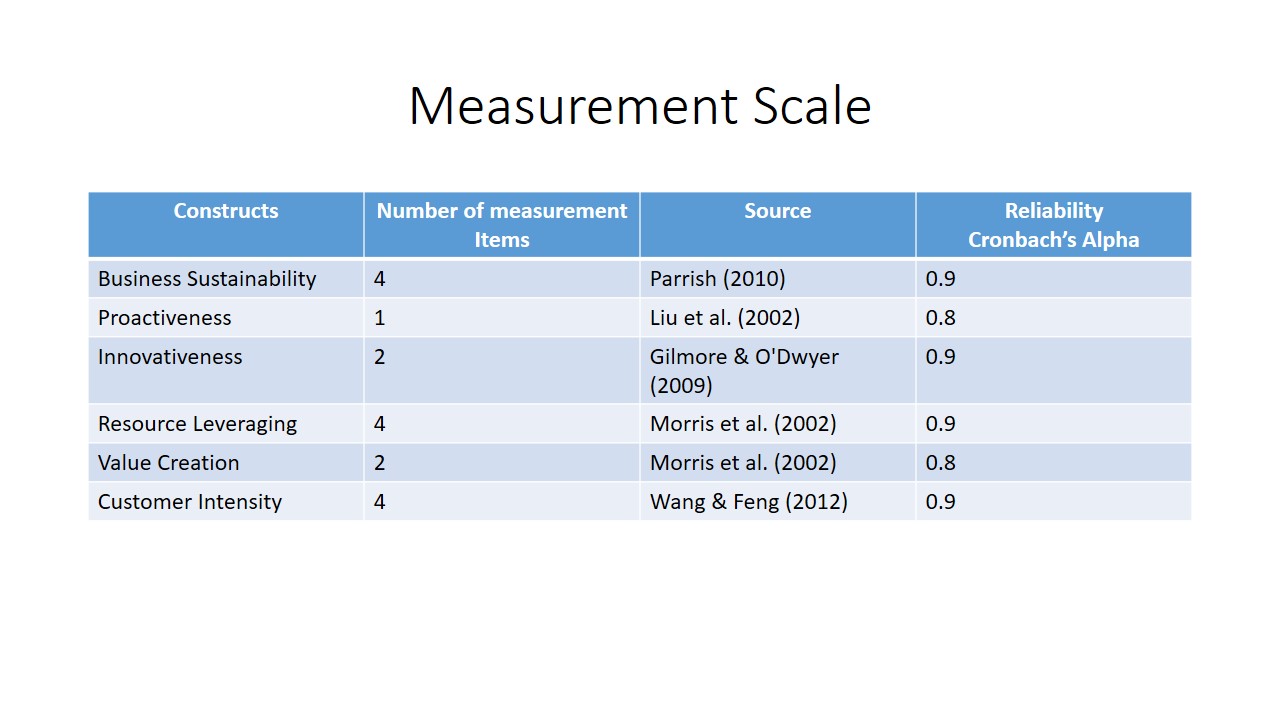
Research Procedure
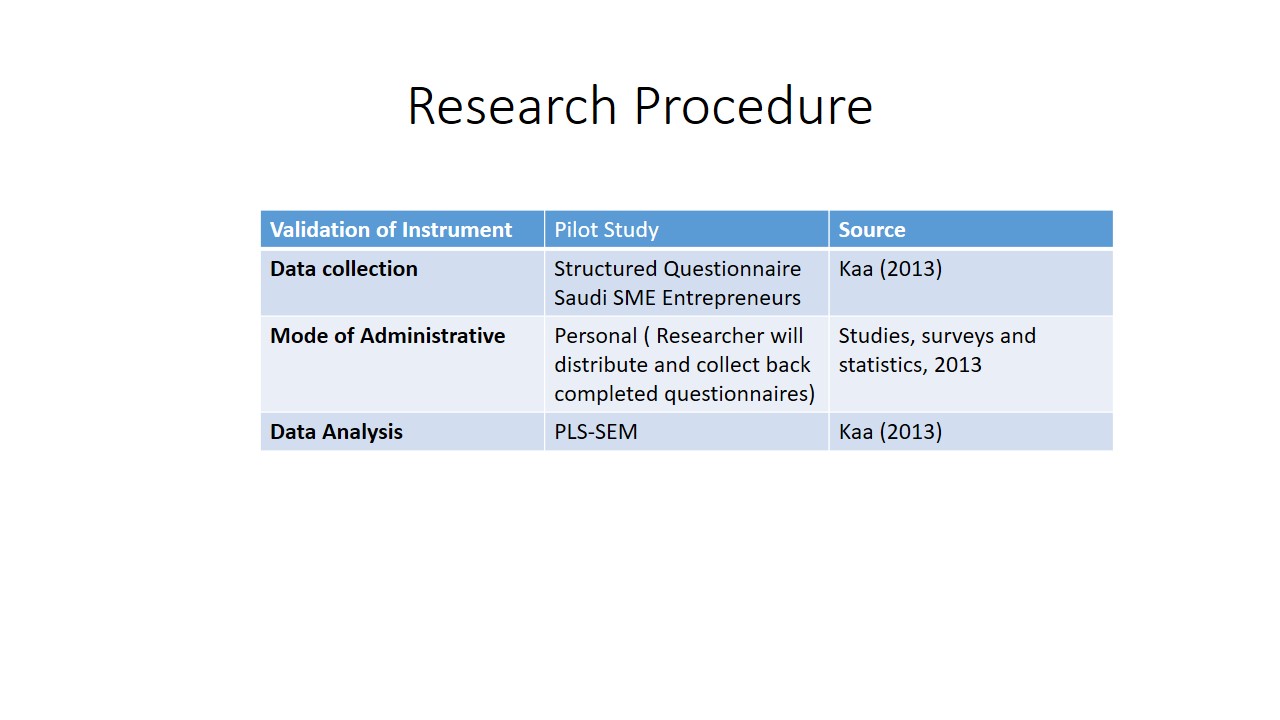
Reference List
Becherer, R. C., Helms, M. M. & McDonald, J. P. (2012). The effect of entrepreneurial marketing on outcome goals in SMEs. New England Journal of Entrepreneurship, 15(1/2), 7.
Bettiol, M., Di Maria, E. & Finotto, V. (2012). Marketing in SMEs: the role of entrepreneurial sensemaking. International Entrepreneurship and Management Journal, 8(2), 223 – 248.
Do, T. H., Mazzarol, T., Volery, T. & Reboud, S. (2014). Predicting anticipated rent from innovation commercialisation in SMEs. European Journal of Innovation Management, 17 (2), 183 – 208.
Gilmore, A. (2011). Entrepreneurial and SME marketing. Journal of research in marketing and entrepreneurship, 13(2), 137 – 145.
Gilmore, A. & O’Dwyer, M. (2009). Innovative marketing in SMEs. European journal of marketing, 43(1/2), 46 – 61.
Harrigan, P., Ramsey, E. & Ibbotson, P. (2012). Entrepreneurial marketing in SMEs: the key capabilities of e-CRM. Journal of Research in Marketing and Entrepreneurship, 14(1), 40 – 64.
Hunt, S. (2012). The evolution of resource-advantage theory. Journal of Historical Research in Marketing, 4(1), 7-29.
Johnsen, D. B. (2009). The ethics of “commercial bribery”: Integrative social contract theory meets transaction cost economics. Journal of Business Ethics, suppl. Supplement, 88(10): 791-803.
Kaa, G. v. d. (2013). Structured inquiry and standardization. International Journal of Innovation, Management and Technology, 4(2), 233.
Lafuente, F. J. M., Lafuente, A. M. G., Guzman-Parra, V. F. & Lafuente, G. J. (2013). Key factors for entrepreneurial success. Management Decision, 51(10), 1932 – 1944.